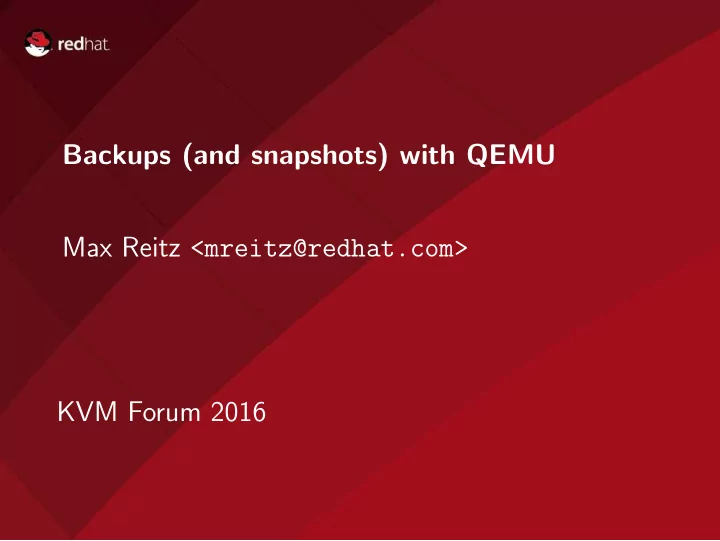

Backups (and snapshots) with QEMU Max Reitz <mreitz@redhat.com> KVM Forum 2016
Part I Kinds of backups Or: Yes, snapshots are backups, too
Real backups
Real backups with QEMU
Not-so-real backups (snapshots)
Not-so-real backups (snapshots) I/O Read missing data Overlay Snapshot
Not-so-real backups (snapshots) I/O Read missing data Overlay Snapshot
Not-so-real backups (snapshots) I/O T op Bottom
Snapshots with QEMU Partially allocated Backing image
Internal snapshots
Part II How not to do backups Or: Why this talk exists
How it doesn’t work
Zooming in... QEMU corrupts QCOW2 images (Internal) snapshots taken with qemu-img while the VM is running Writing to a disk image from two processes may break it
Zooming in... QEMU corrupts QCOW2 images (Internal) snapshots taken with qemu-img while the VM is running Writing to a disk image from two processes may break it
Zooming in... QEMU corrupts QCOW2 images (Internal) snapshots taken with qemu-img while the VM is running Writing to a disk image from two processes may break it
What to do about this: Lock images
What to do about this: Inform people
Part III Creating backups
Section 1 Introduction to QMP
Introduction to QMP QMP Run-time management: Pause, resume, ... Add/remove devices ...and much more, see qmp-commands.txt Try it: -qmp stdio
Introduction to QMP QMP on the line <- { "execute": "some-command", "arguments": { "arg1": "value1" } } -> { "return": {} } -> { "error": { "class": "GenericError", "desc": "..." } } -> { "event": "SOME_EVENT", "timestamp": { ... } }
Introduction to QMP Example command execution <- { "execute": "stop" } -> { "timestamp": { "seconds": 1467422834, "microseconds": 157734 }, "event": "STOP" } -> { "return": {} }
Introduction to QMP Short command notation { "execute": "some-command", "arguments": { "arg1": "value1" } } = some-command(arg1="value1")
Section 2 Creating snapshots
Creating snapshots Internal snapshots blockdev-snapshot-internal-sync device : Name of the block device name : Name of the new snapshot
Creating snapshots Internal snapshots blockdev-snapshot-internal-sync( device="disk0", name="3" )
Creating snapshots Internal snapshots blockdev-snapshot-internal-sync( device="disk0", name="3" )
Creating snapshots External snapshots blockdev-snapshot-sync device : Name of the block device snapshot-file : File name of the new overlay image format : Format of the new overlay image (and more)
Creating snapshots External snapshots blockdev-snapshot-sync(device="disk0", snapshot-file="foo.qcow2", format="qcow2")
Creating snapshots External snapshots blockdev-snapshot-sync(device="disk0", snapshot-file="foo.qcow2", format="qcow2") disk0 foo.qcow2
Section 3 Introduction to block jobs
Introduction to block jobs What are block jobs? Asynchronous operations in QEMU’s block layer Controlled using QMP
Introduction to block jobs How to use block jobs: QMP <- $BLOCK_JOB_NAME(job-id="foo", ...) -> { "return": {} } [Some time passes...] -> { "event": "BLOCK_JOB_COMPLETED", "data": { "device": "foo", ... } }
Introduction to block jobs Block jobs with a “ready” phase
Introduction to block jobs Block jobs with a “ready” phase: QMP -> { "event": "BLOCK_JOB_READY", "data": { "device": "foo", ... } } <- block-job-complete(device="foo") -> { "return": {} } -> { "event": "BLOCK_JOB_COMPLETED", "data": { "device": "foo", ... } }
Section 4 Copying off
Copying off drive-backup block job Copies disk’s data (at the start of the job) to another file Stalls guest writes to areas not yet saved → May slow the guest down Arguments (excerpt): device : Source virtual drive target : Target file name sync : What to copy mode : Should the target file be created?
Copying off sync=full Copy everything Backup
Copying off sync=top Copy only the topmost overlay in the snapshot chain Backup
Copying off sync=incremental Copy data that has changed from the last backup See John’s and Vladimir’s talk from last year: Incremental Backups ( Good things come in small packages !) John Snow ( yes, I know ) Vladimir Sementsov-Ogievskiy Software Engineer, Red Hat Software Developer, Odin 2015-08-20
Copying off drive-mirror block job Copies disk’s data (at the end of the job) to another file Essential for storage migration Does not stall guest, but may copy the same area repeatedly Has a ready phase block-job-complete : Attaches the target image to the guest disk block-job-cancel : Similar to drive-backup No incremental sync mode
Part IV Rolling back
Rolling back Backups and external snapshots: 1 Switch off VM 2 Replace active image by the backup Internal snapshots: 1 Switch off VM 2 Use qemu-img snapshot -a
Part V Discarding backups
Internal snapshots blockdev-snapshot-delete-internal-sync device : Name of the block device name : Name of the snapshot to be deleted (and more)
External snapshots: block-stream block job base
External snapshots: block-stream block job Copies data from the snapshot to the overlay, then drops the snapshot from the backing chain Arguments: device : Name of the block device base : File name of the topmost snapshot to keep (none if not specified) (and more)
External snapshots: block-commit block job top base
External snapshots: block-commit block job Copies data from the overlay to the snapshot, then drops the overlay from the backing chain Arguments: device : Name of the block device base : File name of the snapshot to write into top : File name of the topmost overlay to drop (very topmost overlay if not specified) (and more)
Backups Stand-alone backups: Just delete the file Incremental backups: qemu-img commit
Part VI Which to use
Comparison Int. Sn. Ext. Sn. Backup Rather quick (1) Take Quick Slow Rather quick (1) Roll back Quick Slow Rather quick (1) Depends (2) Discard Slow Format -specific -specific -agnostic Off-site No Not really Yes (1) Requires quite a few metadata updates (2) Quick for stand-alone; slow for incremental
Thank you for listening! Questions?
Recommend
More recommend